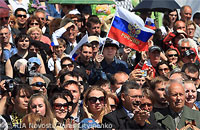Russia shrugged: Searching for national identity

(Moscow News – themoscownews.com – Anna Arutunyan – September 18, 2013) As the Russian government continues to search for a national identity unifying Russians, a recent study shows a society atomized along ethnic and economic lines. With so little holding a people together, the findings, sociologists say, challenge a long-held assumption that Russia is an inherently collectivist society.
“We are self-sufficient, we are not part of any particular group,” Valery Fedorov, head of the All-Russian Center for Public Opinion Research (VTsIOM), the state-funded pollster that conducted the survey, was quoted by RIA Novosti as telling journalists in Moscow last week. “We are a fully individualistic people.”
When respondents were asked what group they identified themselves with most, 32 percent said they were “their own person and didn’t identify with any group,” according to the VTsIOM study, held in August for the Valdai Club of international experts. Eleven percent identified themselves as middle-class and 6 percent identified as pensioners, according to the poll, which was conducted among 1,600 respondents in 45 regions.
The findings pose a particular challenge as President Vladimir Putin meets with experts of the Valdai Club on Thursday to address national identity, with this year’s forum titled “Russian Diversity for the Modern World.”
Ethnic identity and wealth emerged as the deepest dividing factors according to the survey, with many respondents showing a tendency towards xenophobia. “The main dividing line [in Russian society] is between residents of large cities and central Russia as a whole [on the one hand] and the residents of Russia’s Northern Caucasus [on the other],” Fedorov said.
Individualism or Collectivism?
The long-standing dichotomy of Western societies being individualist and Russia being collectivistic is proving increasingly misleading as it clashes with a new reality on the ground, experts say.
“I don’t agree with the philosophers who see Russia as a collectivist society. I see the exact opposite. If you drive past villages, [you will see how] people will reconstruct their own homes, but everything else, the public space, is dilapidated,” Olga Kryshtanovskaya, a sociologist with the Russian Academy of Sciences, told The Moscow News.
According to Kryshtanovskaya, this kind of social atomization is a direct result of the breakup of the Soviet Union, and has increased since the early 1990s.
“[During the Soviet Union], ideology connected people,” Kryshtanovskaya said. “We weren’t Russians, Ukrainians, we were Soviet. So now, we have a big problem with identity.”
According to her findings from the Kryshtanovskaya Laboratory, “people [of ethnic Russian descent] don’t want to consider themselves Russian citizens, Rossiyanin, they identify [instead] with nationality – Russky. Only those who are not ethnic Russians tend to call themselves Rossiyanin.”
According to the VTsIOM survey, when respondents were asked what group they identified themselves with most, just 4 percent identified themselves as ethnic Russians.
The trend towards individualism is a relatively recent historical development, according to Artemy Pushkaryov, senior researcher at the Institute of Russian History at the Russian Academy of Sciences.
“Before the revolution, the main unifying element was Orthodox Christianity, which was based on collectivism,” he told The Moscow News.
“After the fall of the Soviet Union, individualism started being touted as something that society needed to aim for.”
What that has led to, Pushkaryov suggested, is that while society is no longer collectivist, it is not fully individualist either.
The VTsIOM study’s findings, which suggest xenophobia on the one hand and atomization on the other, are part of the same problem, Pushkaryov said.
“Any identification as part of the group should in theory serve some purpose for an individual. In [our] case, people understand that whoever they identify themselves with, they still remain absolutely alone.”
A lot of the patterns that characterize the atomized social structure, Pushkaryov said, came from criminal and prison culture, where “trust no one” became a staple in the recipe for survival.
Trust and volunteering
Indeed, surveys show that interpersonal trust ratings are lower in Russia than in other countries.
According to 2008 figures cited in a 2012 study by Levada Center head Lev Gudkov, only 27 percent of Russian respondents said that they believed other people should be trusted; compared to 42 percent in the United States, 69 percent in Sweden, and an average of 45 percent among 29 countries.
But perhaps the starkest indicators of lack of trust and community involvement were recent figures on volunteering.
When Russian respondents were asked in the fall of 2012 if they’d taken part in volunteer work in the last 12 months, only 1 percent said they had, according to Denis Volkov of the Levada Center polling organization.
By comparison, 26.8 percent of Americans said they volunteered in 2011, according to the Corporation for National and Community Service, a U.S. federal agency. In the UK, that number was 72 percent, according to figures published by the Cabinet Office.
But if social atomization is the problem, then a government-backed national idea will not necessarily stand as a solution, according to sociologist Kryshtanovskaya.
“You can build a house, but you can’t build a tree,” she said. “It’s the same with national identity. It can only grow.”
[featured image is file photo of random crowd in Russia, not directly connected to article subject matter]
